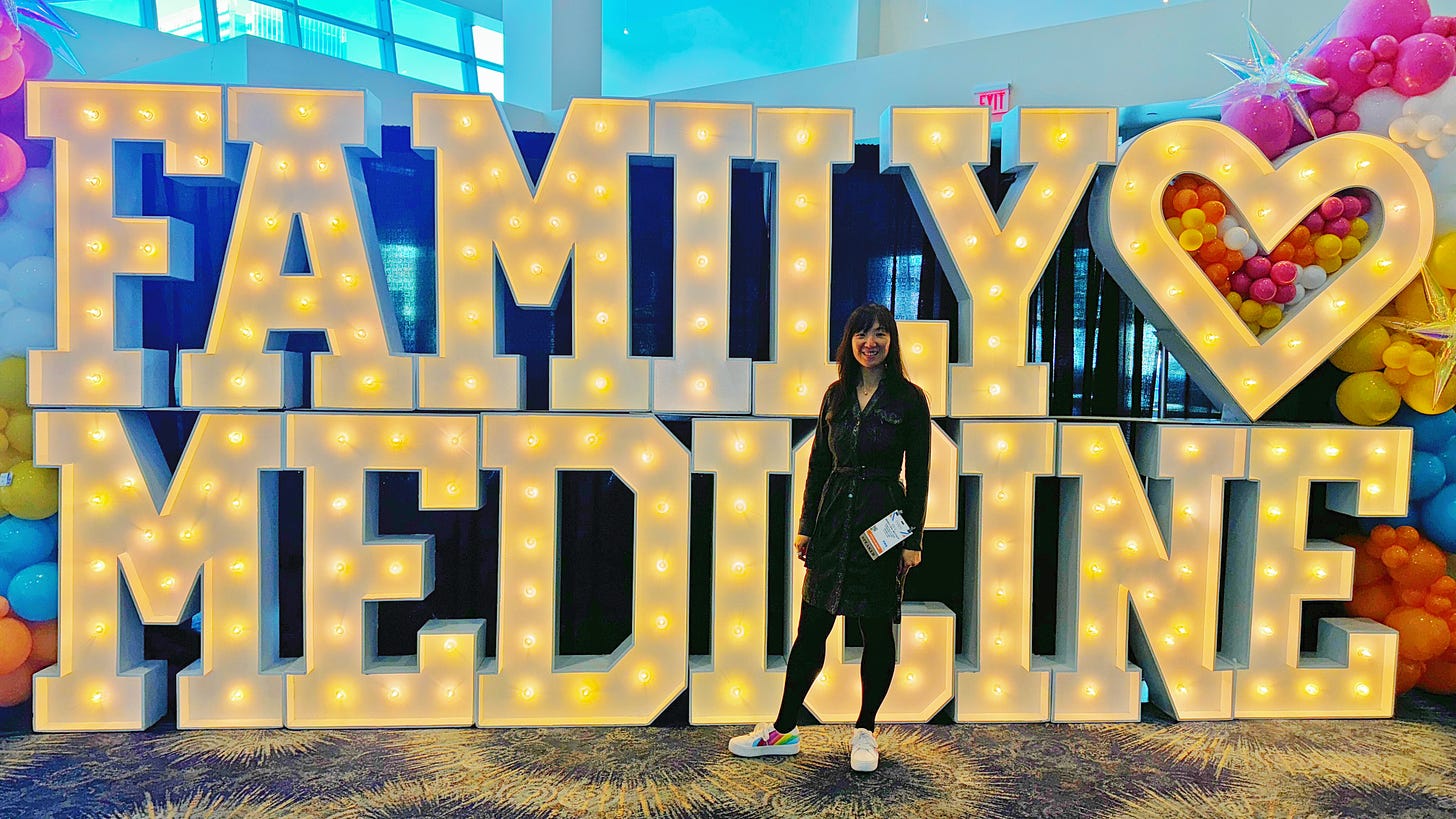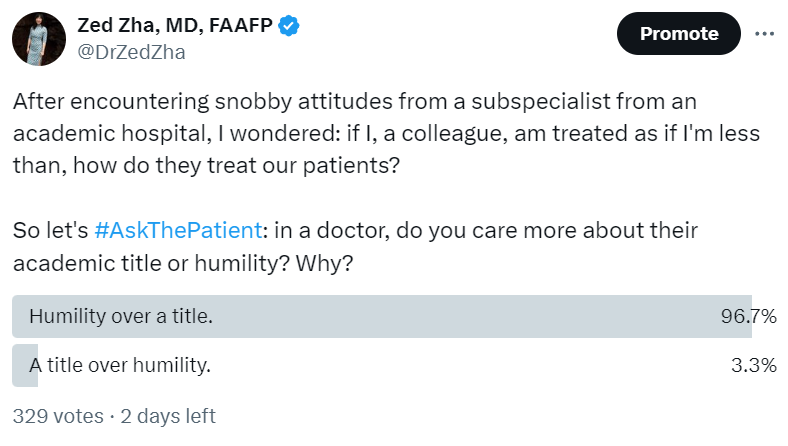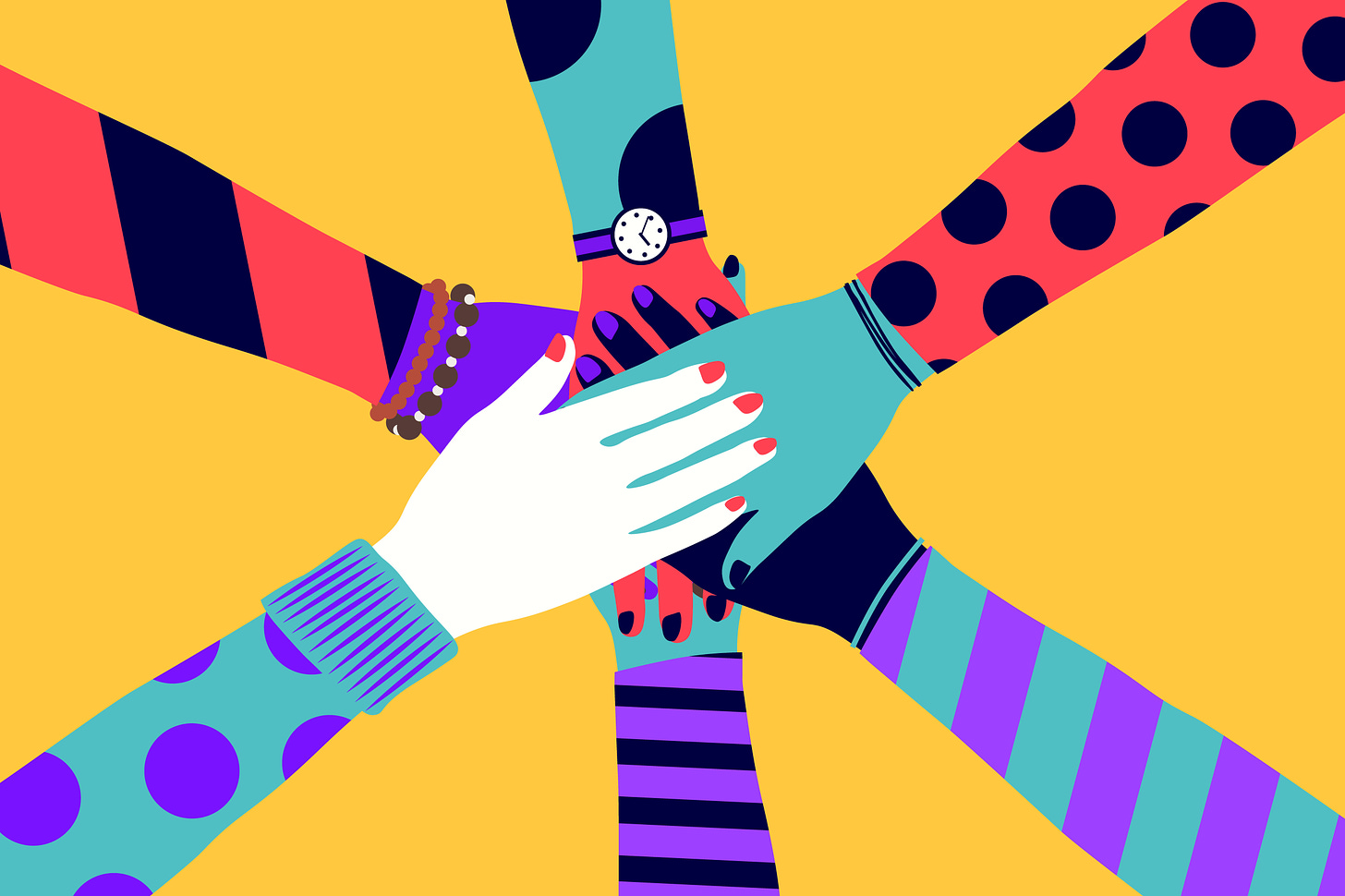Recently, a patient asked me to reach out to her rheumatologist located 3 hours away to help coordinate care. “It’s very difficult for me to travel that far for every lab and test,” she explained. It’s difficult for even the most able-bodied, well-resourced person to do that, let alone a patient with multiple chronic conditions.
I called the rheumatologist’s office and left my cell number with their staff: “I’d love to be a resource for you and the patient locally. Here is my personal number. Let’s be in touch!”
“Oh…ok. I will let the doctor know!” The staff replied with some not-so-subtle hesitation in his voice.
Oh boy, they are one of those. I thought to myself.
Insider vs Outsider
Medicine is incredibly hierarchical. If you’ve been hospitalized or visited a specialist at an academic center, you know what I’m talking about:
In comes a huge team of white coats. The attending orders the fellow around, who orders the resident around, who orders the intern around, who orders the medical student around.
But the real bottom rung on this ladder is the “outside physician” — the doctor from outside the academic center, often a smaller hospital or a clinic. They call to consult (aka “asking stupid questions”) or transfer patients (aka “dumping trainwrecks”).
The condescending attitude toward outside physicians is a learned one: the medical student learns it from the intern, who learns from the resident, who learns…you know the drill.
And by default, I am an outside physician.
I work in rural America and I’m not associated with any academic hospital or medical center. Each time I call the “inside” doctors, I get nervous: will I be dismissed as “the country doctor” this time?
The real question is: if I get treated this way as a doctor, how do they treat our patients?
(I actually have some idea — it’s a story for another time.)
Sure enough, a week later, I got a “Who are you and why did you even call me” kind of voicemail from the rheumatologist. When I called back, I discovered that even though I left them my cell phone number, they called me from their office number. Were they worried I might bombard them with texts and calls to ask random questions as if I didn’t have dozens of patients a day to see myself?
After spending 20 minutes on hold, I finally got through to their staff, who offered to pass on a message, again.
“I guess I just want to make myself available.” Suddenly, I felt like I had nothing important to say.
A month later, the patient told me that instead of working with me as a team, the rheumatologist referred her to another clinician within their system (an “inside” doctor) — 3 hours away. It defeated the purpose of our efforts to provide a medical hub for the patient locally and discounted her concerns. The patient was angry yet also almost apologetic about it: “I’m sorry they didn’t accept your offer to help.”
“I understand,” I said.
But I didn’t.
We didn't.
I’m Where I’m Needed
Last week, I lectured at the American Academy of Family Physicians national conference. In the hotel elevator, I met a pilot who said he appreciated what we did as family docs.
“Unlike you, we do the groundwork!” I was p-unstoppable. 👀
While he didn’t get my joke (his loss), what I really meant was:
Family doctors don’t just lay the groundwork for healthcare. We navigate the clouds of uncertainty with patients, piloting our shared journey toward hope and healing.
We do preventative health, pediatrics, urgent visits, women’s health, obstetrics, addiction medicine, sports medicine, hospital medicine, wilderness medicine, hospice, HIV/AIDS care, (and in my case) dermatological medicine, gender-affirming care, etc.
We are in inner-city hospitals, in small rural towns, on reservations, in jail/prison systems, visiting people at home, traveling to see people on the streets, flying helicopters into remote villages, on the frontlines of global disasters rescuing patients, etc.
And when the pandemic hit, while the plastic surgeons retreated home on sabbatical, we family doctors stepped up to staff the clinics, hospitals, public health departments, etc.
We didn’t say “Oh! This is out of my scope of practice.”
We said: “Yes. I’m right here.”
And right here is where I still am. Right here is where people need me to be.
#AskThePaient
Let me be clear: arrogance and snobby attitudes don’t serve patients. Instead, they show precisely how disconnected we are from those who need us the most. Patients don’t care who wears what title and from where. They prize humanism over prestige, and humility over status.
Overwhelmingly so!
How do I know? I asked:
This #AskThePatient poll is still ongoing. How would you vote?
I’m on #TeamPatient
What if we come down from our high horses and think of ourselves as colleagues to each other?
What if we do this no matter where we are, what kind of resources we have, and what specialty we belong to?
And what if we ditch the tired insiders vs outsiders, us vs them game in medicine?
Not Team Rheumatology or Team Family Medicine.
But Team Patient.
Our team uniform isn’t white coats or scrubs, but humility.
We score not through proving ourselves superior,
but through making our patients’ lives easier,
their voices heard,
their diagnoses clearer,
and their suffering less.
And we win not by running ahead,
but by placing the patient at the center of all we do.







I love love love this and the honest depiction of it all. Thanks for sharing this! I'm definitely one of the outsiders too. It took a personal toll for a while, until I decided what mattered the most -- and that's my patients and the quality of attention I can provide to them. Human, caring, empathetic attention to work as a team is what I believe in. Patients deserve to be listened to more than anything. I have so many opinions about this all, and yet, I can't change the system right now. But what we can do is precisely this: actually Care. 💜
Thanks for putting this all into words!
So many in medicine went into it with the (often I acknowledged) goal of gaining the approval and external validation of others. The “making myself feel important by belittling those around me” attitude is pervasive in medicine. Especially academics. Largely, as you point out, due to the intellectual bludgeoning that is so normalized in the Ivory Towers.
I love your voice! I’m excited to follow your work!